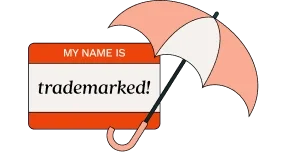Whether you need to hire a trademark attorney depends on your particular situation. Trademark attorneys have experience prosecuting trademarks before the United States Patent and Trademark Office (USPTO). Because trademark registration is a legal proceeding with strict procedures and deadlines, a lawyer who specializes in the process can handle registration more efficiently than you can on your own.
There is no requirement that you hire and work with a trademark attorney, but depending on how much time you have to dedicate to the trademark filing process and your ability to be detail-oriented, you might want someone knowledgeable to assist you.

There are a number of ways working with a trademark lawyer can help you more easily navigate complicated legal processes.
A trademark attorney can:
- Identify problems that might arise with your trademark registration. For example, someone else might have common law or state trademark rights that aren’t registered with the USPTO and won’t show up when you search the USPTO’s trademark database. A lawyer can conduct a more thorough trademark search.
- Evaluate the strength of your trademark and advise you on choosing a strong mark.
- Explain how you should use your mark to give it maximum protection.
- Prepare and file a trademark registration application that meets all USPTO requirements.
- Advise you on the likelihood that the trademark registration process will succeed.
- Respond to issues that come up after your application has been filed and assigned to an examining attorney at the trademark office.
Help you enforce your trademark in the future. The USPTO does not enforce trademarks—that’s up to the trademark owner. A lawyer can help monitor new trademark applications or uses of your trademark and take steps to oppose or stop potentially infringing uses.
Why hire a trademark lawyer?
If you’re interested in filing for a trademark and protecting your intellectual property, it’s important to understand that the process can be complicated and full of potential pitfalls. While you can navigate that on your own, letting a trademark lawyer be your guide can make the process simpler and take less time.
There are a number of ways a law firm with experience in trademarks can benefit and support you through the trademark registration process. You can choose to work with an attorney throughout the entire process or bring someone on to help you with a specific step or challenge along the way.
Legal advice
First and foremost, trademark attorneys can offer you legal advice on trademark law. You might want advice on:
- The viability of your trademark application
- The strength of your mark and whether or not it can be legally protected
- Understanding how to file your application
- Preparing and filing an accurate and complete application with the USPTO to increase the likelihood that your trademark is approved
- Providing a representative example of how your trademark will be used on the market
- Reply to questions or concerns from the trademark examining attorney at the USPTO
- Sharing information with you on the bounds of your trademark rights
- Supporting you and helping you defend against any trademark infringement or challenges
- Helping you to maintain your trademark registration
As you can see, there are a number of different ways that an experienced attorney can help guide you through the trademark application process and support you in defending and maintaining your trademark once it’s registered.
Comprehensive trademark search
Another task that a lawyer who offers trademark services can help you with is completing a thorough trademark search.
Before you apply to register your trademark, you’ll want to assess whether or not that mark is already in use or registered by someone else.
If someone is using or has registered a mark that is similar enough to yours, then your trademark application will be rejected. You won’t be able to register your mark.
Something that’s often misunderstood about trademarks is that the use of a mark provides immediate, local trademark protection. Even without registration, you have the right to use your mark in your local market as long as it’s not too similar to any other mark.
Trademark registration provides a higher level of protection for your mark and allows for its use nationwide without infringement.
An attorney can help you to complete a thorough search that ensures there are no other similar marks already in use. A comprehensive search includes searching:
- The USPTO’s database of registered trademarks
- Other state databases of registered trademarks
- Sources of unregistered trademarks that are protected by common law

Trademark application process
A lawyer can help you navigate the application process. Once your application has been completed and submitted, you’ll still need to receive approval. Before approval is granted, a USPTO lawyer may have questions or recommend changes to your mark. Your lawyer can help guide you through that process and answer the questions that are asked.
Representation during appeal
If your trademark application is denied or there are issues with your application, a lawyer can represent you during the appeal process with the Trademark Trial and Appeal Board, or TTAB. The USPTO's trademark trial process can be a challenge to navigate on your own.
You may need to work with the TTAB under these circumstances:
- Appealing the final ruling of an examining attorney
- Challenging the registration of someone else’s trademark
- Responding to another party’s challenge of your trademark registration
Each of these proceedings has specific procedures and deadlines. A trademark lawyer can help you to navigate the process and present your best case or defense.
Help enforce and maintain trademark rights
If you’re granted trademark registration, it then becomes your legal responsibility to monitor, enforce, and maintain your trademark rights.
An attorney can help you understand the legal scope of your rights and how to defend them, when necessary. They can advise you on what to do if you notice someone using your trademark without authorization and can guide you through the process of challenging that use.
To maintain your trademark rights, you must continue to use your trademark and file registration maintenance paperwork regularly. An attorney can help you with filing this paperwork on time.
While it might be less expensive to file your trademark yourself, unless it’s done correctly the first time, you run the risk of spending additional time on your process by going through the examination process for a mark that’s not unique enough. If done correctly, the DIY method can be less expensive than hiring an attorney. But, there are many potential pitfalls along the way where you may end up needing the help of an attorney anyway, which will cost you more time and money.
Common problems when people try to register their own trademark
The trademark registration process may seem straightforward, but the requirements can be confusing. As a result, trademark owners can make costly mistakes that could have been avoided if a lawyer had prepared or reviewed the application.
Common mistakes include:
- Selecting an improper filing basis. There are two filing bases: use of the mark in commerce and intent to use the mark in commerce. Many people choose the wrong basis because they don’t understand the difference. This mistake can create a registered trademark that offers little or no protection when you try to enforce it.
- Submitting an improper trademark specimen. As part of the application, you must submit a specimen that shows how you actually use your mark in commerce. Submit the wrong type of specimen, and you may not get protection for your mark.
- Choosing the wrong trademark class or misidentifying your goods or services. You must choose a class of goods or services to protect your trademark, and you must identify the goods and services you want to protect. The classification structure can be confusing, and getting it wrong can cause your application to be denied.
In the end, it may cost much more to hire a lawyer to deal with an improperly prepared application than it would have cost to hire a lawyer to do it right the first time.
How to find trademark attorneys
If you’re planning to file for trademark registration or are in the midst of attempting to defend a trademark and want the help of an experienced lawyer, there are a few places you can go to find someone with the specialized knowledge you need.
In all likelihood, you won’t be able to hire a traditional business attorney. Instead, you’ll want to find someone who specializes in intellectual property law or specifically works on trademark law.
Small business referrals
The best referrals always come from people we know and trust. Start by asking around to other fellow business owners you know if they’ve worked with an attorney to file for a trademark. If that specific case doesn’t come up, you may try asking a friend’s business lawyer if they know any trademark attorneys. Oftentimes, lawyers know lawyers with other specialties, especially those that may be similar to their own.
Local business groups
If you’re part of any local business groups, whether they meet in person or have an online forum, this can be a great place to request an introduction to a local lawyer who offers trademark services.
You might also find local attorneys are invited to speak at business conferences or attend events.
This can be a great way to connect with someone and vet whether or not you’ll like working with them.
Local bar association
You can also find an attorney by searching your state or local bar association website. These online referral databases often include lawyer’s names, contact information, and legal specialty.
Online legal services
Many online legal services also keep a list of lawyers who are able to help with trademark issues. At LegalZoom, our online tool allows you to fill out a few simple questions and be connected to an experienced, knowledgeable trademark attorney. You can also call to do a free trademark consultation before getting started.
Our trademark search and registration package costs $649 plus federal fees. This package includes:
- A comprehensive search of existing, pending, and common law trademarks
- Personalized advice from an experienced attorney on the viability of your trademark
- Preparation and filing of your trademark application to the USPTO
If your application is rejected, we offer our Second Chance Promise and will help you file another application for free.
Online legal services such as what we and a few other companies offer, have made it easier for business owners to get connected to the right attorney and to affordably file for trademark protection. Before you work with an attorney, be sure to review their page and read reviews from past clients to ensure you’ll be a good fit to work together.
Free: USPTO Law School
If you’re just starting out and don’t have a lot to invest in trademark registration, you can also find some affordable or free legal help.
The United States Patent and Trademark Office Law School Clinic Certification Program is a training program for lawyers who want to specialize in intellectual property law. Students need real-world practice filing trademark applications and, under the guidance of faculty, can submit your application for free.
You might also be able to find a local lawyer who is willing to work pro bono (for little or no cost for the public good) or for free on your trademark application. The American Bar Association has a list of attorneys by state who may be able to help for free. You can also apply through the International Trademark Association to use some of their pro bono services.
How to choose the right trademark attorney
When filing for a trademark, you’ll spend time working closely with your attorney and their trademark law firm. It’s important to find someone who is highly qualified to do the work while also being someone you can communicate with well.
- Experience: Before hiring an attorney, be sure to ask about previous trademark experience. You want to work with someone who specializes in trademark law and has a strong track record of first-time approvals with applications. You may also want to search for someone who has experience working with your specific industry, such as an intellectual property attorney who works specifically with restaurant owners. This can give them an edge in the trademark search process because they’re already familiar with your competitors.
- Credentials: It may seem obvious, but it’s important to ask your attorney whether they’re licensed in the U.S.
- Reputation: To ensure you’re getting an accurate read on your potential attorney, ask to speak to past clients, read online reviews, and check out the website for client testimonials to validate their success rate and see what others have to say about their work.
- Communication: A trademark application can be a long process. It’s important that you can communicate well and clearly with your attorney and their law firm. Ask them about their process in working with clients, how involved you can be in the process, and how often they provide updates to clients.
- Process: When you hire an attorney, you're essentially hiring their entire law firm and team. Be sure to ask who will be working on your trademark application through the process.

FAQs
Can I file a trademark application myself?
Yes, you can file a trademark application yourself. While you can DIY the trademark registration process, there’s the potential for many complications along the way. Hiring an experienced attorney lowers the risk of your trademark being rejected or missing important deadlines.
How much does it cost to hire a trademark attorney?
Electronic trademark filing fees currently range from $225 to $400 per class of goods or services, depending on the type of application you file, according to the USPTO website. The cost of filing a paper application is currently $600 per class of goods or services.
Additionally, every 10 years you must file an application to renew your trademark registration. USPTO fees for trademark renewals are currently about $300 for an electronic application and $400 for a paper application.
The USPTO employs certain factors to calculate the filing fee for an initial application, including the number of trademarks, number of classes, and chosen filing option (called TEAS Standard or TEAS Plus). You may only apply for one trademark per filing. The filing fee is not refunded if the trademark application is rejected.
In addition to filing fees, the cost to hire a trademark lawyer can range from a few hundred dollars to a few thousand dollars, depending on the complexity of your situation and other factors. Some trademark attorneys charge by the hour, while others will handle your matter for a flat fee.
What are the benefits of trademark registration?
Obtaining a federally registered trademark allows you to distinguish your product or service from your competitors' products or services. When the USPTO provides its stamp of approval on a trademark, a legal presumption of ownership is created that provides the company the exclusive rights to use the trademark in connection with its products and services.

